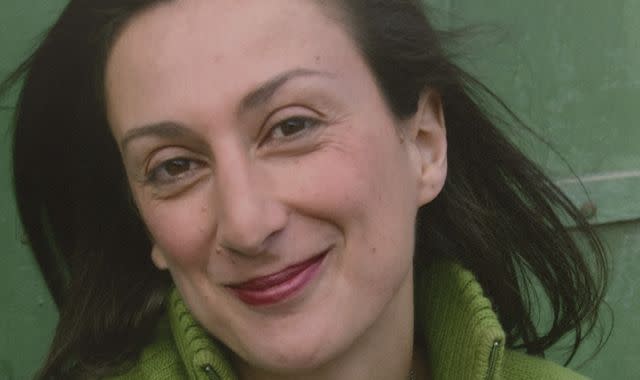Brothers jailed for 40 years over car-bomb murder of investigative journalist Daphne Caruana Galizia in Malta

Two brothers have each been jailed for 40 years for the car-bomb murder of a top investigative journalist in Malta.
George Degiorgio, 59, and sibling Alfred, 57, had denied killing Daphne Caruana Galizia in a blast as she drove home on 16 October, 2017.
But they both dramatically changed their pleas hours after their trial began on Friday at a court in the capital Valletta.
Anti-corruption journalist Ms Caruana Galizia, 53, was reporting on suspected fraud in political and business circles in Malta when her car exploded in the town of Mosta.
The bomb, placed under the driver's seat, was detonated via a mobile phone by George Degiorgio, the court heard.
It triggered an explosion powerful enough to send the car wreckage flying over a wall and into a field.
The Degiorgio brothers are said to have been hired by a top Maltese businessman who allegedly has ties to the government.
A suspect has been charged and will be tried at a later date.
Trial judge Edwina Grima also ordered the brothers to pay €50,000 (£43,450) - around a third of the €150,000 (£130,460) payment they allegedly received to carry out the killing - together with court costs.
They changed their plea following an unsuccessful attempt to negotiate a pardon in exchange for naming other high-profile alleged conspirators - said to include a former government minister whose identity has not been revealed.
The brothers both pleaded guilty to wilful homicide, causing an explosion which resulted in the death of a person and illicit possession of explosives.
They also admitted criminal conspiracy, promoting, constituting, organising or financing an organisation with a view to commit criminal offences, and active participation in a conspiracy.
A third defendant, Vincent Muscat, was earlier sentenced to 15 years in prison for his part in the plot to kill Ms Caruana Galizia.
Leading journalist faced dozens of lawsuits
Ms Caruana Galizia, hailed as a "one-woman WikiLeaks", had written at length about suspected corruption in Malta on her website, Running Commentary.
Her targets included people within former prime minister Joseph Muscat's inner circle, whom she accused of having offshore companies in tax havens disclosed in the Panama Papers leak - one of the biggest data breaches in history.
However, the journalist also focused on the activities of the opposition party.
At the time of her death, she was facing more than 40 libel lawsuits, which are still being pursued posthumously.
Mr Muscat was forced to resign after businessman Yorgen Fenech was arrested for allegedly being complicit in the plot in 2019, sparking a series of mass protests in Malta.
Fenech, who has connections with senior government officials, was charged with a number of offences including conspiracy to commit murder in 2021.
He denies all the charges against him and a date has yet to be set for his trial.
A self-confessed middleman, taxi driver Melvin Theuma, was granted a presidential pardon in 2019 in exchange for giving evidence against Fenech and other suspects.
A further two men, Jamie Vella and Robert Agius, are due to face trial for allegedly supplying the bomb.
Read more world news:
Senior official first to publicly speak out against Iran's hijab crackdown
Drunk fans at Qatar World Cup to be sent to special zones to sober up
One of the journalist's sons, Matthew Caruana Galizia, said he was "relieved" the Degiorgio brothers had been convicted and sentenced - but said five years was "far too long" to achieve this stage of justice for his mother.
"Now it's about the remaining cases," he added.
Maltese state blamed for murder after creating 'culture of impunity'
An independent inquiry into Ms Caruana Galizia's death in July last year said the Maltese state was responsible for her murder because it created "a culture of impunity".
The report concluded there was no evidence the state was directly involved in her killing - but said it had to "bear responsibility".
In a statement released shortly after the sentences were passed, Maltese Prime Minister Robert Abela said: "This is an important step forward, to deliver justice in a case that represents a dark chapter in Malta's history."
The Council of Europe's commissioner for human rights, Dunha Mijactovic, lashed out at the "lack of effective results in establishing accountability" five years after the murder.
The commissioner wrote to Mr Abela to call for urgent protection to be given to journalists in Malta.

 Yahoo News
Yahoo News 
